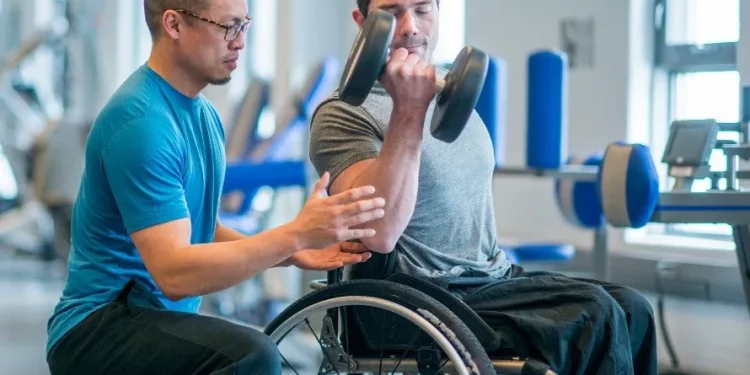In the dynamic landscape of fitness, where individual needs vary widely, the concept of adaptive fitness certification is gaining prominence. This certification goes beyond traditional fitness training, embracing inclusivity, and tailoring workouts to diverse abilities. Let’s explore the world of adaptive fitness certification and understand why it’s becoming a game-changer in the fitness industry.
Table of Contents
Evolution of Fitness Certification
Traditional fitness certifications have long been the standard for aspiring fitness professionals. However, the one-size-fits-all approach has limitations, often excluding individuals with unique needs. Adaptive fitness certification emerged as a response to this gap, aiming to provide a more comprehensive and inclusive training experience.
Benefits of Adaptive Fitness Certification
Inclusivity and Diversity
One of the primary advantages of adaptive fitness certification is its emphasis on inclusivity. Trainers equipped with this certification can cater to a broader audience, including individuals with disabilities or specific health conditions. This not only expands the reach of fitness programs but also fosters a more diverse and welcoming fitness community.
Customized Fitness Programs
Adaptive fitness trainers excel in creating personalized workout plans. Unlike generic routines, these trainers adapt exercises to accommodate different abilities and goals. This level of customization ensures that fitness programs are not only effective but also enjoyable for individuals with varying needs and preferences.
Key Components of Adaptive Fitness Certification
To become a certified adaptive fitness trainer, individuals undergo rigorous training modules that encompass theoretical knowledge and practical assessments. The certification process equips trainers with the skills to adapt exercises, create inclusive fitness plans, and effectively communicate with diverse clients.
Accreditation and Recognition
Importance for Professionals
Accredited adaptive fitness certifications hold significant value in the fitness industry. They demonstrate a trainer’s commitment to inclusivity and continuous learning. Employers, fitness centers, and clients are increasingly recognizing the importance of these certifications, creating more job opportunities for certified trainers.
Industry Standards
As the demand for adaptive fitness grows, industry standards are evolving. Recognized certifications set benchmarks for competence, ensuring that trainers meet specific criteria to provide high-quality adaptive fitness services.
Job Opportunities for Certified Adaptive Fitness Trainers
Growing Demand
The demand for certified adaptive fitness trainers is on the rise. Fitness centers, rehabilitation facilities, and community programs seek professionals who can cater to diverse populations. This trend reflects a societal shift towards prioritizing accessible and inclusive fitness options.
Varied Employment Settings
Certified trainers find opportunities in various settings, from traditional gyms to specialized facilities for individuals with disabilities. This versatility allows adaptive fitness professionals to choose environments that align with their interests and expertise.
Challenges and Solutions
Addressing Misconceptions
Despite the evident benefits, adaptive fitness certification faces misconceptions. Some believe it’s only relevant for a niche market. Trainers and certification bodies actively work to dispel these myths, highlighting the broad applicability of adaptive fitness principles.
Continuous Learning and Adaptation
The fitness industry evolves rapidly, and adaptive fitness trainers must stay ahead. Continuous education and staying informed about the latest advancements ensure that certified trainers provide cutting-edge and effective fitness solutions.
Success Stories
Profiles of individuals who have benefited from adaptive fitness training showcase the positive impact of certified trainers. These success stories not only inspire others but also emphasize the transformative potential of adaptive fitness.
How to Obtain Adaptive Fitness Certification
Eligibility Criteria
To pursue adaptive fitness certification, individuals typically need a background in fitness or related fields. This ensures a foundational understanding of exercise physiology and training principles.
Certification Process
The certification process involves a combination of coursework, practical assessments, and exams. Successful completion grants individuals the status of a certified adaptive fitness trainer, ready to make a positive impact in the fitness community.
Comparison with Conventional Certifications
Differentiation Factors
Adaptive fitness certifications stand out from conventional certifications due to their focus on inclusivity and customization. While traditional certifications are valuable, adaptive fitness certifications address specific needs and bridge gaps in the fitness industry.
Market Trends
As awareness grows, market trends indicate an increasing preference for adaptive fitness. Trainers with these certifications find unique opportunities and contribute to shaping the future of fitness training.
The Future of Adaptive Fitness Certification
Anticipated Developments
The future holds exciting possibilities for adaptive fitness certification. Anticipated developments include advancements in adaptive technology, increased collaboration with healthcare professionals, and the integration of adaptive principles into mainstream fitness education.
Integration into Mainstream Fitness Education
As the benefits become more apparent, adaptive fitness principles are likely to be incorporated into mainstream fitness education. This shift will ensure that future fitness professionals are well-equipped to address the diverse needs of the population.
Testimonials from Certified Trainers
Real-life Experiences
Certified adaptive fitness trainers share their experiences, detailing the positive outcomes they’ve witnessed in their clients. These testimonials provide valuable insights into the practical applications and benefits of adaptive fitness training.
Impact on Professional Growth
Trainers discuss how obtaining an adaptive fitness certification has positively impacted their professional growth. The certification opens doors to unique opportunities and positions them as experts in a rapidly evolving field.
Industry Support and Partnerships
Collaborations with Fitness Organizations
The adaptive fitness movement is gaining support from established fitness organizations. Collaborations and partnerships ensure that certified trainers have access to resources, mentorship, and networking opportunities.
Advocacy for Inclusivity
Certification bodies actively advocate for inclusivity in the fitness industry. They work towards creating awareness, breaking barriers, and fostering an environment where adaptive fitness is embraced as a standard practice.
FAQs About Adaptive Fitness Certification
- Is adaptive fitness certification only for individuals with disabilities?
- No, adaptive fitness certification is designed to cater to a broad range of individuals with diverse needs and preferences.
- Do adaptive fitness trainers work only in specialized facilities?
- While some trainers choose specialized settings, many work in traditional gyms, rehabilitation centers, or community programs.
- How does adaptive fitness certification contribute to career growth?
- Certification opens doors to diverse job opportunities and positions trainers as experts in inclusive fitness.
- Can individuals with no fitness background pursue adaptive fitness certification?
- While a fitness background is beneficial, individuals with a genuine interest can pursue adaptive fitness certification.
- Is adaptive fitness the future of the fitness industry?
- There’s a growing trend towards inclusivity, making adaptive fitness an integral part of the evolving fitness landscape.
Conclusion
In conclusion, adaptive fitness certification is reshaping the fitness industry by prioritizing inclusivity and customization. Certified trainers play a crucial role in creating a fitness environment that caters to individuals with diverse needs. As the demand for inclusive fitness options grows, the significance of adaptive fitness certification is set to rise, ensuring a more accessible and welcoming fitness community for all.


 Home
Home









